Montessori Toys
Montessori Toys: Educational, Engaging, and Developmental
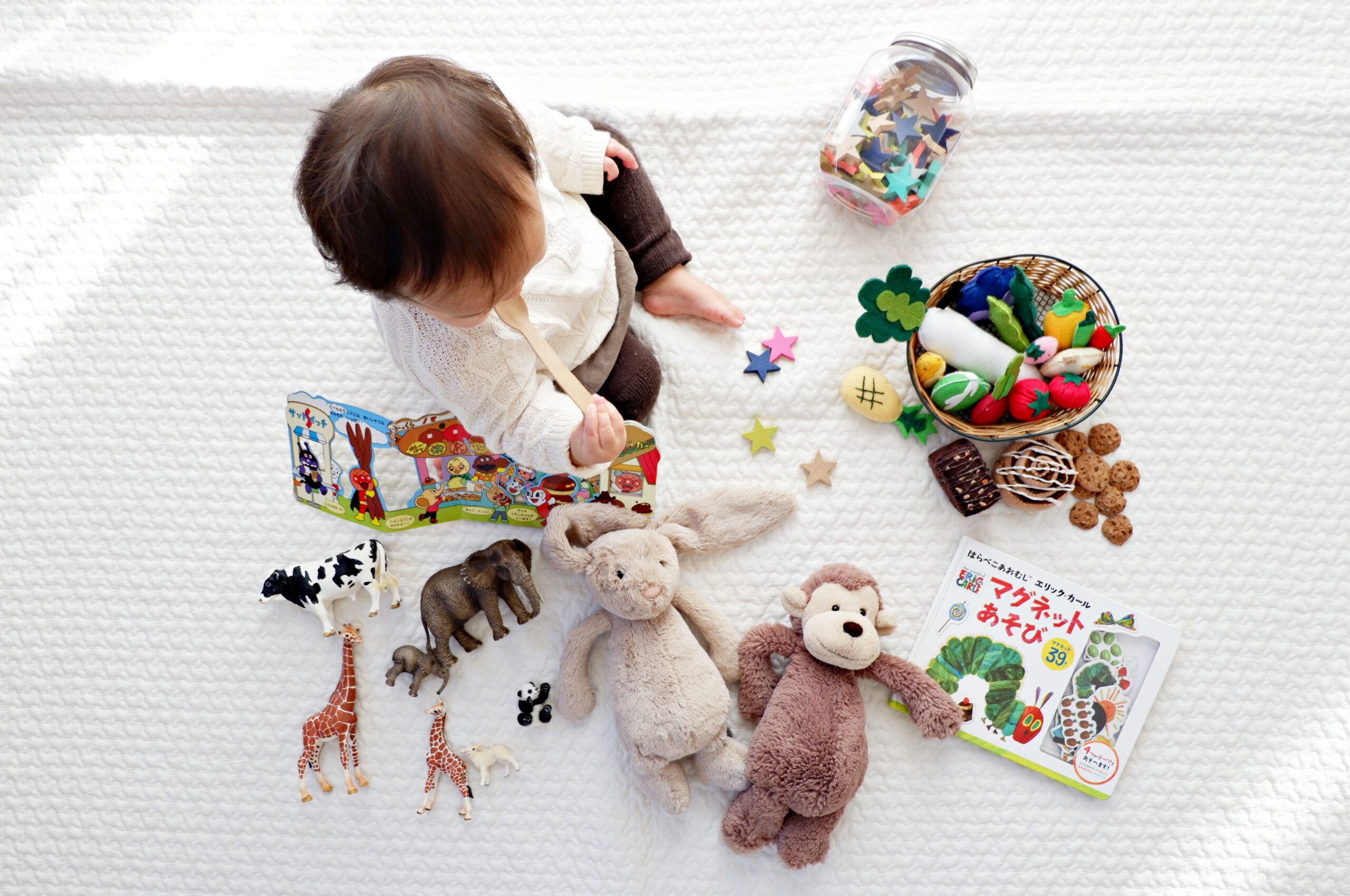
Did you know that toys created in the Montessori style serve not only as educational tools but also as engaging aids in child development?
As a parent, I’ve discovered the incredible benefits these toys offer in fostering my child’s learning and growth. From promoting fine motor skills to encouraging problem-solving and creativity, Montessori toys have proven to be a valuable tool in supporting my child’s overall cognitive development.
In this article, I will explore the various ways Montessori toys unlock potential and unleash imagination, while building skills and independence in children.
Key Takeaways
- Montessori toys are educational and aligned with a child’s development stages.
- They foster independence, exploration, and problem-solving skills.
- Montessori toys are simple, open-ended, and made from natural materials.
- They are designed to engage and challenge children while supporting learning and brain development.
The Benefits of Montessori Toys for Child Development
I believe that Montessori toys offer numerous benefits for child development. One of these benefits is supporting fine motor control. By manipulating and interacting with these toys, children can develop their fine motor skills and hand-eye coordination.
Another benefit is enhancing sensory exploration. The different textures, colors, and shapes of Montessori toys encourage sensory exploration, which is crucial for the development of a child’s brain.
Montessori toys also promote concentration and focus. As children engage in activities that require their attention and persistence, they develop their ability to concentrate and focus.
Overall, Montessori toys provide a well-rounded approach to child development. They nurture various skills and abilities in a fun and educational manner.
Exploring Montessori Toys: A Guide for Parents
As a parent, I found it helpful to explore different types of toys that align with the Montessori philosophy. Montessori toys are known for their educational, engaging, and developmental benefits for children. They are designed to foster independence, exploration, and problem-solving skills.
These toys are often simple, open-ended, and made from natural materials, which engage and challenge children. They support learning and brain development, promoting fine motor control, sensory exploration, coordination, concentration, and language development. Montessori toys also encourage order, concentration, and boost confidence and independence.
Some recommended Montessori toys for 1-year-olds include sensory toys like soft blocks and activity boards, simple shape sorters and peg puzzles, stacking toys, and books. These toys develop fine motor skills, problem-solving abilities, language development, and creativity in children.
How Montessori Toys Foster Learning and Growth
By fostering independence, exploration, and problem-solving skills, Montessori toys create an environment that promotes learning and growth.
These toys are designed to engage children in hands-on activities that encourage them to think critically and solve problems on their own.
The open-ended nature of Montessori toys allows children to explore their own interests and discover new concepts at their own pace. This promotes a sense of independence and self-confidence as they navigate through different challenges.
Through these toys, children also develop important fine motor skills and hand-eye coordination, which are essential for their overall development.
Montessori toys not only provide educational value but also foster a love for learning and a sense of curiosity in children, setting them up for success in their future endeavors.
Engaging Children With Montessori Toys: a Developmental Approach
Children can learn and grow through hands-on exploration and problem-solving activities that encourage independence and critical thinking. Engaging children with Montessori toys provides a developmental approach that fosters their cognitive, physical, and emotional development.
When children engage with Montessori toys, they benefit from:
- Open-ended play opportunities that spark creativity and imagination.
- Opportunities to develop fine motor skills through activities like stacking and sorting.
- Sensory exploration, which enhances their understanding of the world around them.
- Problem-solving challenges that promote critical thinking and decision-making skills.
Educational Value of Montessori Toys: What Parents Need to Know
When I choose toys for my child, I prioritize their educational value and the skills they can develop. Montessori toys are an excellent choice because they offer a wide range of benefits for children’s development. These toys align with their developmental stages and promote independence, exploration, and problem-solving skills. They are designed to engage and challenge children, supporting their learning and brain development. Montessori toys come in various forms, from wooden sorting and stacking toys to sensory stacking and building toys. They also include shape sorting and matching toys, busy board toys, and much more. The educational value of Montessori toys is significant as they support fine motor control, sensory exploration, coordination, concentration, and language development. They also promote order, concentration, confidence, and independence. Choosing Montessori toys can provide a holistic learning experience for children while keeping them engaged and stimulated.
| Educational Value of Montessori Toys | Benefits of Montessori Toys |
|---|---|
| Support fine motor control | Boost confidence |
| Enhance sensory exploration | Encourage problem-solving |
| Develop coordination | Support language development |
| Promote concentration | Align with developmental stage |
| Foster independence | Promote order and concentration |
Choosing the Right Montessori Toys for Your Child’s Development
As a parent, I prioritize selecting toys that align with my child’s developmental needs and foster their growth and learning. When it comes to Montessori toys, I have found that they are educational, engaging, and developmental.
Montessori toys are designed to support a child’s learning and brain development. They are simple, open-ended, and made from natural materials, which encourage exploration and problem-solving skills. These toys are also designed to engage and challenge children, promoting independence and fostering a sense of accomplishment.
Montessori toys support fine motor control, sensory exploration, coordination, and concentration. They also boost confidence and independence, encourage problem-solving, and support language development.
Overall, Montessori toys are a valuable addition to my child’s toy collection, providing them with educational and engaging experiences.
Developmental Milestones and Montessori Toys: A Perfect Match
I have found that developmental milestones and Montessori toys are a perfect match for supporting my child’s growth and learning.
Montessori toys are designed to align with the child’s development stages, promoting independence, exploration, and problem-solving skills. These toys are simple, open-ended, and made from natural materials, engaging and challenging children in their play.
Wooden sorting and stacking toys, like the Montessori Wooden Sorter Cube and the Ulanik Balls in Cups, enhance cognitive skills and hand-eye coordination.
Pulling and teething toys, such as the Food Grade Silicone Developmental Toy, provide sensory stimulation and relief during the teething phase.
Farm animal counting and color sorting toys, like the Montessori Farm Animal Counting Toy, promote counting skills and color recognition.
Enhancing Learning Through Play: The Power of Montessori Toys
By incorporating these play materials into my child’s daily routine, they are able to enhance their learning and development in a fun and engaging way. Montessori toys are specifically designed to support a child’s cognitive, physical, and emotional development. They are made from natural materials and encourage independent exploration and problem-solving skills. These toys promote hands-on learning and foster creativity and critical thinking abilities. Montessori toys also help develop fine motor skills, hand-eye coordination, and language development. They promote concentration and focus, which are essential skills for future learning. Additionally, Montessori toys align with the child’s developmental stage, ensuring that they are age-appropriate and provide the right level of challenge. Incorporating Montessori toys into my child’s playtime not only facilitates their learning but also nurtures their overall growth and development.
| Benefits of Montessori Toys | How They Enhance Learning |
|---|---|
| Support cognitive, physical, and emotional development | Promote hands-on learning and problem-solving skills |
| Develop fine motor skills, hand-eye coordination, and language development | Foster creativity, critical thinking, concentration, and focus |
| Align with the child’s developmental stage | Provide age-appropriate challenges and learning opportunities |
Montessori Toys: Unleashing Creativity and Imagination
Unleashing creativity and imagination, these play materials provide endless opportunities for exploration and self-expression. As a parent, I have seen firsthand how Montessori toys can engage and captivate my child’s imagination. Here are three reasons why these toys are so effective:
-
Open-ended play: Montessori toys are designed to be simple and open-ended, allowing children to use their creativity and imagination to play in various ways.
-
Natural materials: Montessori toys are often made from natural materials like wood, which not only provides a sensory experience but also promotes a connection to nature.
-
Problem-solving skills: Montessori toys encourage children to think critically and find solutions to challenges, fostering their problem-solving skills in a fun and engaging way.
With these play materials, children can explore, create, and learn while having fun.
Building Skills and Independence With Montessori Toys
In my previous discussion on Montessori toys, I highlighted how they can unleash creativity and imagination in children. Now, let’s delve into the topic of building skills and independence with Montessori toys. These toys are specifically designed to foster the development of various skills while promoting independence in children.
To illustrate this, let’s take a look at the following table that showcases some examples of Montessori toys and the skills they help develop:
| Montessori Toy | Skill Developed |
|---|---|
| Wooden Sorting and Stacking Toys | Fine motor skills, hand-eye coordination, problem-solving |
| Pulling and Teething Toys | Sensory exploration, fine motor skills |
| Farm Animal Counting and Color Sorting Toys | Counting, color recognition, sorting |
| Coin Box and Race Track Toys | Object permanence, hand-eye coordination, cause and effect |
| Dinosaur-themed Toy | Fine motor skills, sensory exploration |
These toys are carefully designed to engage children and provide them with opportunities to explore, problem-solve, and develop essential skills. By allowing children to independently manipulate these toys, they learn to think critically, make decisions, and develop a sense of accomplishment. So, not only are Montessori toys educational and engaging, but they also contribute significantly to a child’s overall development and independence.
The Role of Montessori Toys in Cognitive Development
I have found that Montessori toys play a significant role in enhancing cognitive development in children. These toys are designed to engage and challenge children, supporting their learning and brain development.
Montessori toys, such as wooden sorting and stacking toys, pulling and teething toys, and farm animal counting and color sorting toys, provide opportunities for children to explore, problem-solve, and develop important cognitive skills. These toys promote independence, fine motor control, sensory exploration, and concentration. They also encourage language development and boost confidence in children.
Montessori toys align with the developmental stages of children and promote order and concentration. By providing a variety of Montessori toys, parents can support their child’s cognitive development and provide them with a strong foundation for future learning.
Unlocking Potential: Montessori Toys for Holistic Child Development
As a parent, I have observed that incorporating Montessori toys into my child’s playtime routine has resulted in a well-rounded development.
Montessori toys are educational, engaging, and developmental, offering a range of benefits for children. These toys are designed to align with a child’s developmental stages, fostering independence, exploration, and problem-solving skills.
They are simple, open-ended, and made from natural materials, engaging children in hands-on learning experiences. Through activities like wooden sorting and stacking toys, pulling and teething toys, and farm animal counting and color sorting toys, children develop fine motor control, sensory exploration, coordination, and concentration.
Montessori toys also boost confidence and independence, encourage problem-solving, and support language development. By promoting order and concentration, these toys facilitate overall cognitive development and prepare children for future success.
Frequently Asked Questions
What Are Some Popular Montessori Toys for 1-Year-Olds?
Some popular Montessori toys for 1-year-olds include sensory toys like soft blocks and activity boards. Simple shape sorters and peg puzzles are also great options. Stacking toys and banging toys are both fun and educational. Books and mirrors can provide hours of entertainment. Toys with functions like phones and push/pull toys are also popular choices.
These toys are educational because they help develop fine motor skills, hand-eye coordination, problem-solving, critical thinking, language development, and creativity. They also promote independence and focus.
Montessori toys are designed to align with a child’s developmental stage and support overall cognitive development.
Are Montessori Toys Suitable for Children With Special Needs?
Montessori toys can be beneficial for children with special needs. They provide a hands-on, engaging approach to learning and can support various developmental skills.
Montessori toys encourage independence, problem-solving, and sensory exploration, which can be particularly helpful for children with special needs. By promoting concentration, fine motor skills, and cognitive development, these toys can provide a positive and inclusive learning experience for all children.
It’s important to choose age-appropriate toys that align with the child’s abilities and interests.
How Do Montessori Toys Promote Language Development?
Montessori toys promote language development by providing opportunities for children to engage in meaningful and interactive play. Through activities like sorting, stacking, and matching, children learn vocabulary related to shapes, colors, and sizes. They also develop their communication skills by describing their actions and asking questions.
Additionally, Montessori toys often incorporate language-rich materials like books and puzzles, which help expand children’s vocabulary and foster a love for reading. Overall, these toys create a language-rich environment that supports language development in 1-year-olds.
Can Montessori Toys Be Used for Group Play and Social Interaction?
Montessori toys can definitely be used for group play and social interaction. They provide opportunities for children to engage with each other, collaborate, and learn important social skills such as sharing, taking turns, and problem-solving together.
Montessori toys encourage cooperative play and communication, fostering a sense of community and teamwork. By engaging in group play with these toys, children can develop their social and emotional skills while having fun and learning together.
Are There Any Safety Considerations When Choosing Montessori Toys for Young Children?
When choosing Montessori toys for young children, there are important safety considerations to keep in mind.
It is crucial to select toys that are age-appropriate and free from small parts that could pose a choking hazard. Additionally, toys should be made from non-toxic materials and be sturdy enough to withstand rough play.
It’s also wise to regularly inspect toys for any signs of wear or damage and to follow the manufacturer’s guidelines for proper use.
Avery brings the magic of words to life at Toddler Ride On Toys. As a dedicated writer, she combines her love for writing with her fascination for child development to craft articles that resonate with our audience. With a background in journalism and a knack for storytelling, Avery’s pieces inform, engage, and inspire parents and caregivers.
Montessori Toys
3 Best Safe Non-Toxic Materials for Children’s Toys

Our research has identified the top three materials for children’s toys that are safe and free from toxins.
Wood, organic cotton, and BPA-free plastic are the best choices for parents who want to ensure the safety of their little ones.
These materials are not only free from harmful chemicals, but they are also durable and eco-friendly.
In this article, we will delve into the benefits of each material and provide recommendations for the best toys made from them.
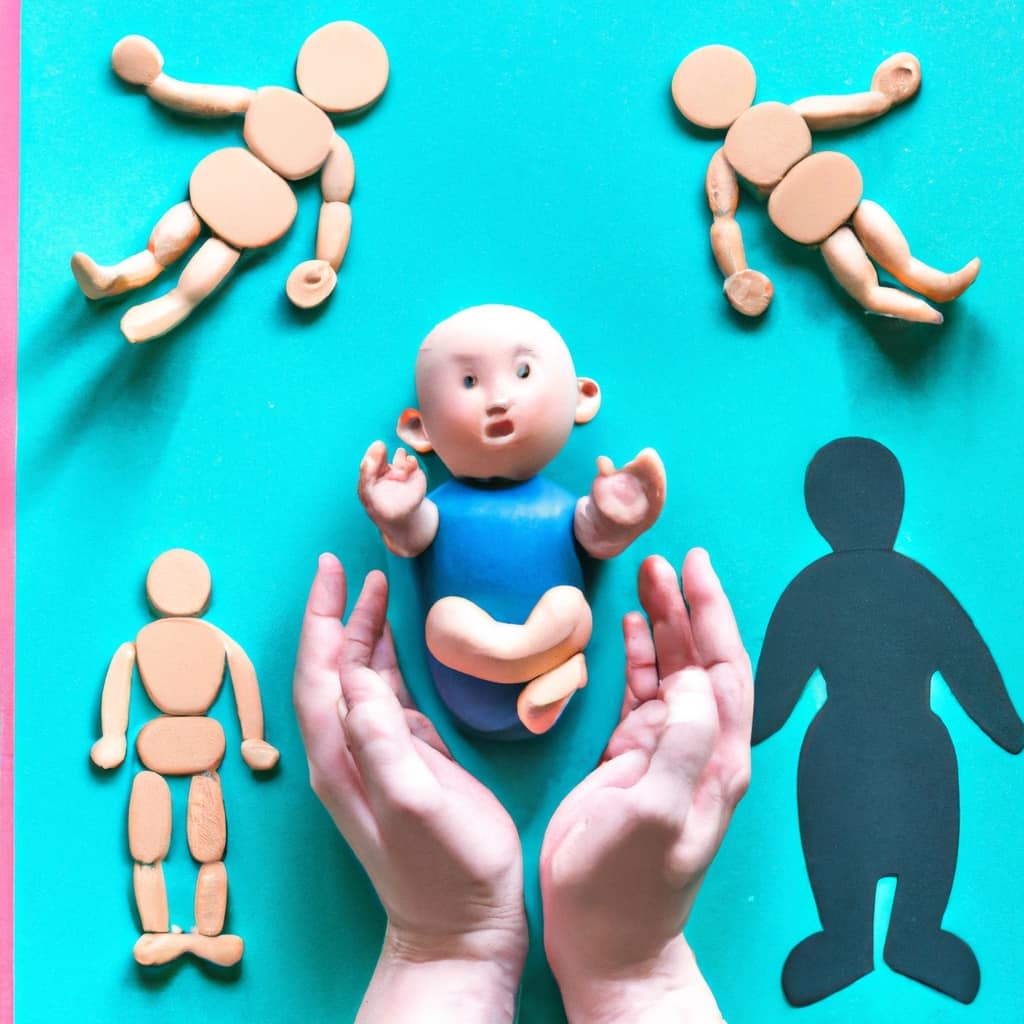
Key Takeaways
- Wood is a durable and long-lasting material, making it a safe and non-toxic option for children’s toys.
- Organic cotton is a gentle and hypoallergenic material that promotes a healthier environment and supports fair trade practices.
- BPA-free plastic eliminates the risk of exposure to harmful chemicals and provides peace of mind for parents.
- Toys made from wood and organic cotton have a long lifespan and can be passed down to future generations, making them a sustainable and eco-friendly choice.
Wood
Wood is one of our favorite materials for children’s toys due to its durability and natural beauty. Wooden puzzles and wooden building blocks are classic toys that provide endless hours of entertainment and educational value for children.
Wooden puzzles aren’t only fun to play with, but they also help develop problem-solving and fine motor skills. They come in various shapes and sizes, catering to different age groups.
Wooden building blocks, on the other hand, encourage creativity and imagination. Children can build structures, towers, and even create their own mini worlds using these blocks.
Wood is a safe and non-toxic material, making it ideal for children’s toys. Its sturdy nature ensures that these toys can withstand rough play and last for years, making them a great investment for both parents and caregivers.
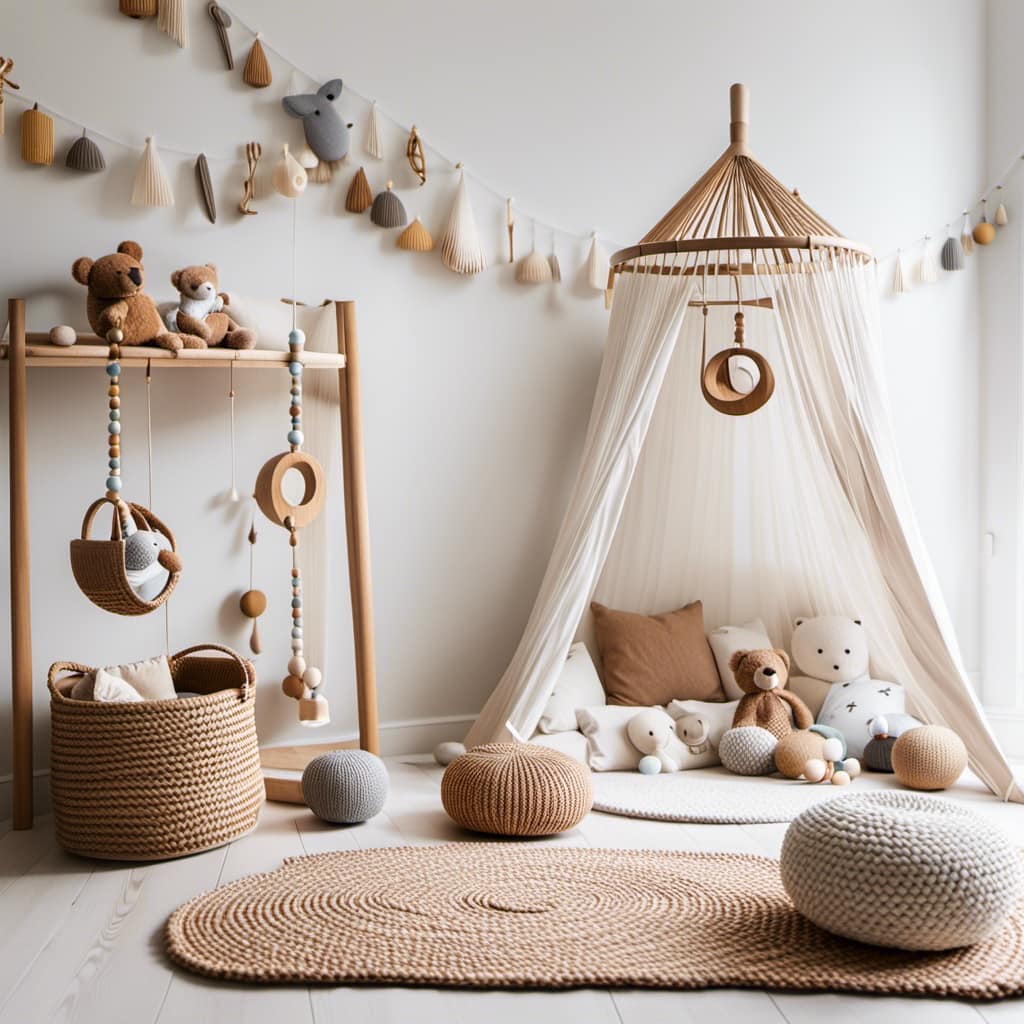
Organic Cotton
Moving on from wood, another excellent safe and non-toxic material for children’s toys is organic cotton. Organic cotton toys offer several benefits for both children and the environment. Here are some key points to consider:
- Chemical-free: Organic cotton is grown without the use of harmful pesticides or synthetic fertilizers, making it a safer option for children to play with.
- Hypoallergenic: Organic cotton is gentle on sensitive skin, making it suitable for children with allergies or sensitivities.
- Sustainable: Organic cotton farming practices promote soil health and biodiversity, reducing the overall impact on the environment.
The impact of organic cotton farming on the environment is significant. By avoiding the use of harmful chemicals, it helps preserve soil quality, reduces water pollution, and protects wildlife. Additionally, organic cotton production supports fair trade practices and ensures a safer working environment for farmers.
Choosing organic cotton toys not only promotes child safety but also contributes to a healthier planet for future generations.
BPA-Free Plastic
One option to consider for safe and non-toxic children’s toys is BPA-free plastic. BPA, or bisphenol A, is a chemical commonly found in plastic products that has been linked to various health risks, especially in children. BPA can leach out of plastic toys and enter the body when children put them in their mouths or handle them extensively.
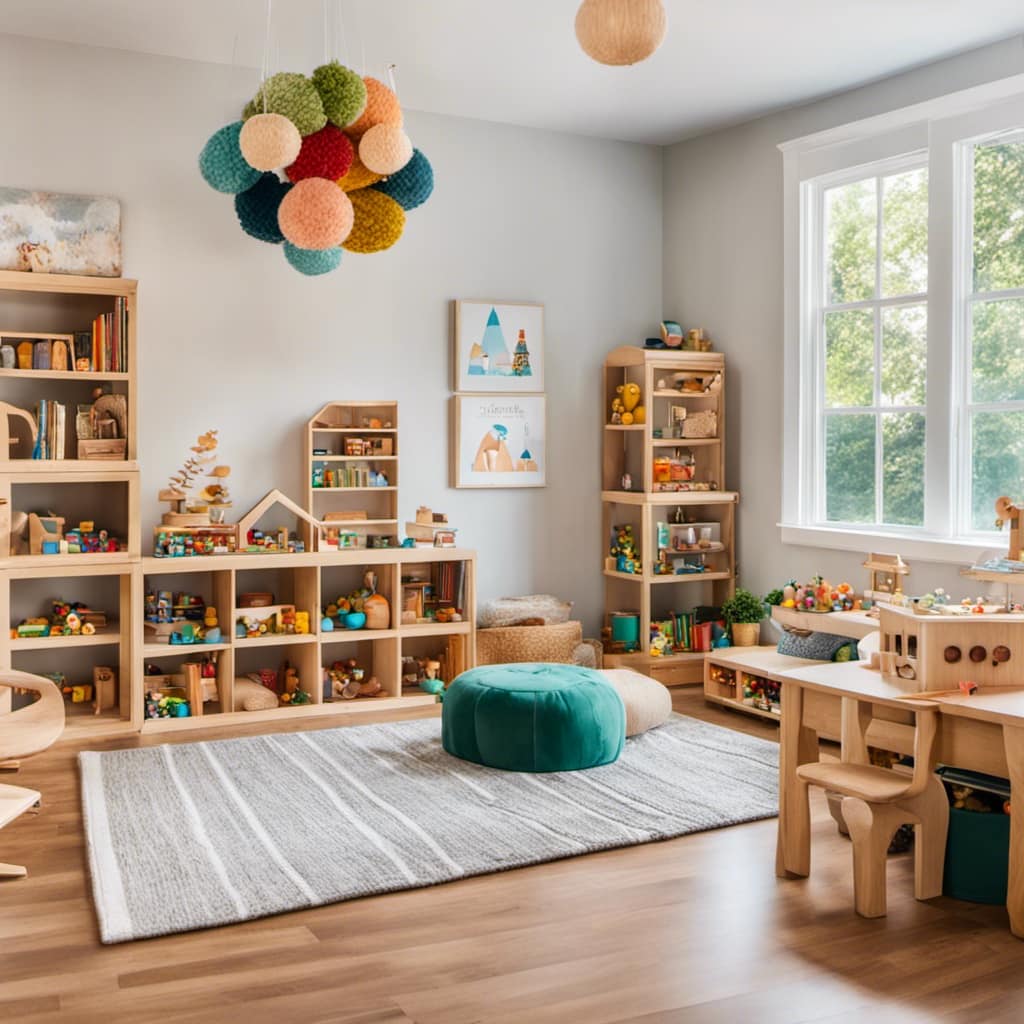
To address these concerns, manufacturers have started producing toys made from BPA-free plastic, which eliminates the risk of exposure to this harmful chemical. These eco-friendly alternatives provide parents with peace of mind, knowing that their children can play with toys that are safe and non-toxic.
When choosing children’s toys, it’s important to prioritize their health and well-being by opting for BPA-free plastic options.
Frequently Asked Questions
Are There Any Specific Safety Standards or Certifications That Parents Should Look for When Purchasing Wooden Toys for Their Children?
When purchasing wooden toys for our children, it’s important to look for safety standards and certifications. Reading labels helps ensure non-toxic materials. Be cautious of toxic finishes or paints that pose potential risks.
Is Organic Cotton Used as a Stuffing Material in Plush Toys Completely Free of Chemicals and Pesticides?
Organic cotton toys: Are they truly chemical free and safe? We’ve got the scoop. Choosing organic cotton for your little ones means you’re opting for a safer, non-toxic playtime experience.
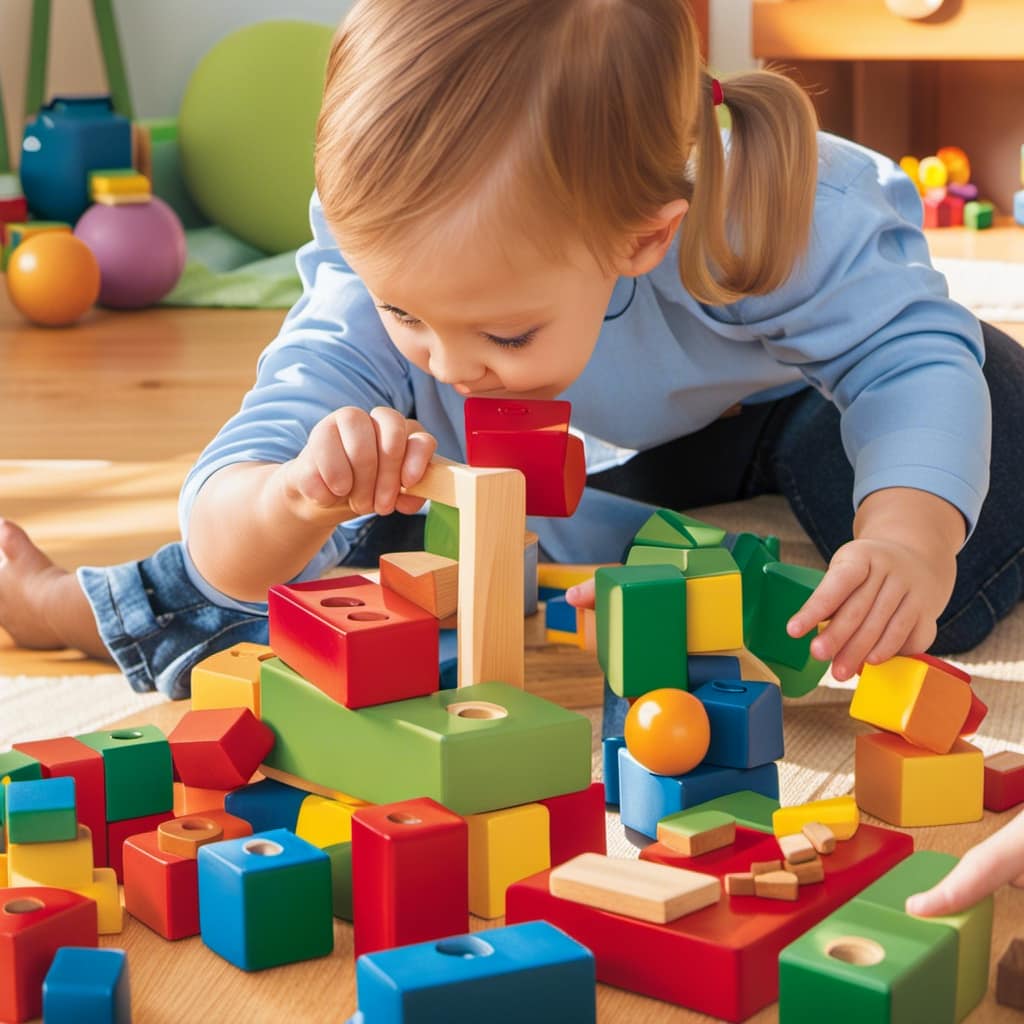
Can Bpa-Free Plastic Toys Still Contain Other Potentially Harmful Chemicals?
Yes, BPA-free plastic toys may still contain other potentially harmful chemicals. To minimize concerns about chemical exposure, consider alternative materials for children’s toys, such as wooden or organic cotton options, which are eco-friendly.
How Can Parents Ensure That the Wooden Toys They Purchase Are Not Treated With Toxic Finishes or Paints?
Parents play a vital role in promoting safe play for their children. Understanding the importance of non-toxic toys is crucial. To ensure wooden toys are safe, research brands that prioritize natural, non-toxic finishes and paints.
Are There Any Potential Health Risks Associated With the Use of Organic Cotton Toys, Such as Allergies or Sensitivities?
There may be potential health risks associated with organic cotton toys, such as allergies or sensitivities. It’s important for parents to be aware and consider any potential reactions when choosing toys for their children.
Conclusion
In conclusion, when it comes to choosing safe and non-toxic materials for children’s toys, nothing beats the timeless charm of wood. Its durability and natural beauty make it a perfect choice for little ones.

Additionally, organic cotton provides a soft and chemical-free option for cuddly toys.
And let’s not forget about BPA-free plastic, which offers a safe and sturdy alternative for certain toys.
With these top three materials, you can ensure that your child’s toys are both fun and safe.
Mila, a gifted writer with a heart brimming with enthusiasm for child development and playful learning, is the creative force behind the enchanting narratives and insightful articles that grace Toddler Ride On Toys. With a background in early childhood education and a genuine passion for nurturing young minds, Mila weaves words that captivate, educate, and inspire parents, caregivers, and educators.
Montessori Toys
Top 5 Quality Producers of Learning Toys

We have searched the market to bring you the top educational toy manufacturers. These five companies excel in creating toys that are educational and engaging for children.
Melissa & Doug, PlanToys, Hape, Grimm’s, and Learning Resources have all earned their spots on our prestigious list. Get ready to discover the finest quality toys that will inspire learning and imagination in your little ones.
Let’s dive into the world of these outstanding producers and explore their exceptional creations.
Key Takeaways
- Melissa & Doug, PlanToys, Hape, Grimm’s, and Learning Resources are the top producers of learning toys.
- These brands prioritize sustainability, using organic materials, non-toxic dyes, and child-safe finishes.
- The learning toys offered by these brands stimulate cognitive, physical, and social skills, as well as creativity and problem-solving abilities.
- Incorporating learning resources in early childhood education enhances problem-solving skills, critical thinking abilities, effective communication, creativity, and independent exploration.
Melissa & Doug
The article discusses the quality of learning toys produced by Melissa & Doug. Melissa & Doug is a renowned brand that offers a wide range of learning toys for early childhood development. These toys provide numerous benefits for children’s learning and development.
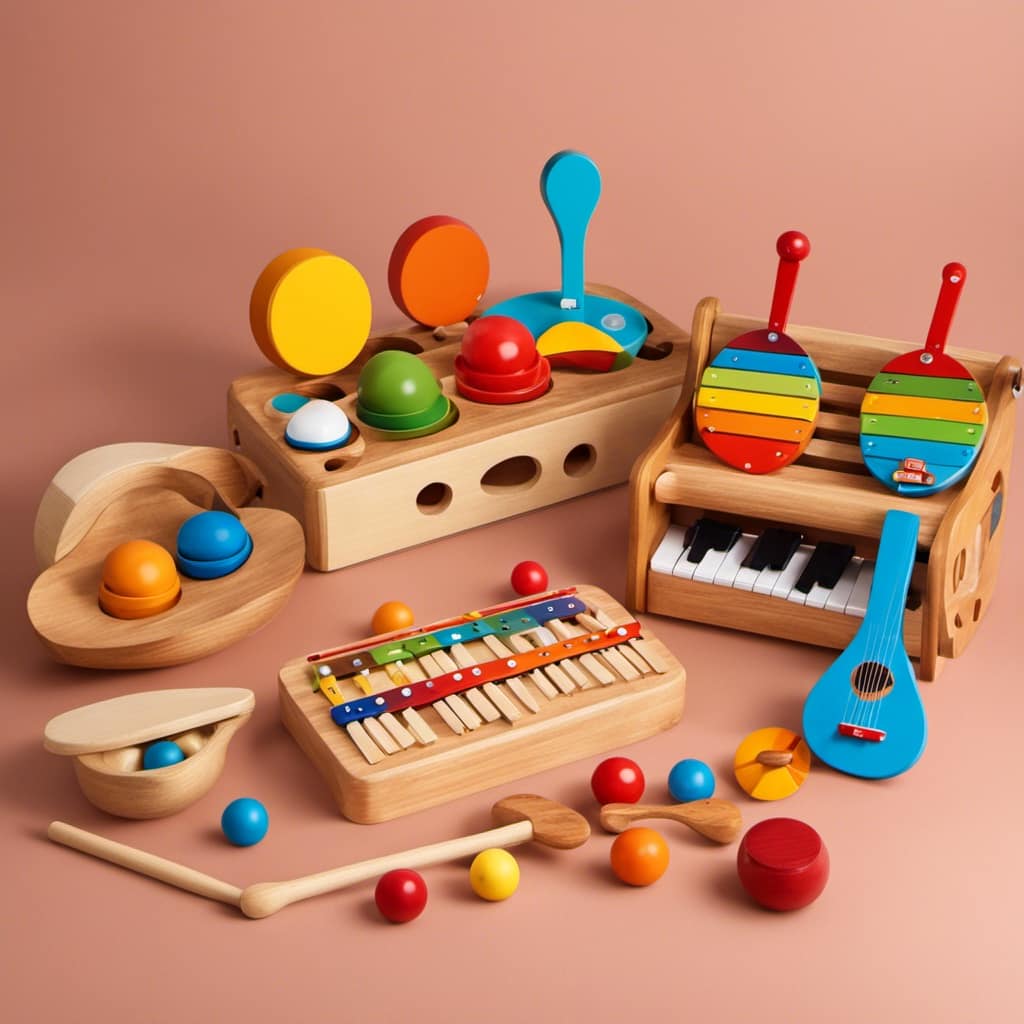
One of the key advantages of Melissa & Doug learning toys is their ability to promote imaginative play. Through imaginative play, children can explore their creativity, problem-solving skills, and social interactions. These toys encourage children to use their imagination, which is crucial for their cognitive and emotional growth.
Melissa & Doug toys are designed to engage children in hands-on activities, allowing them to learn through exploration and play. Transitioning into the subsequent section about plantoys, it’s important to consider the different approaches and features offered by various toy producers.
PlanToys
Introducing PlanToys, a leading producer of learning toys that prioritize sustainability and child development. PlanToys is known for their eco-friendly toys and sustainable play options, making them a top choice for environmentally conscious parents.
PlanToys takes pride in their commitment to using organic materials and non-toxic dyes in their products. They also prioritize sustainable manufacturing practices, ensuring that their toys are made in an environmentally friendly manner.
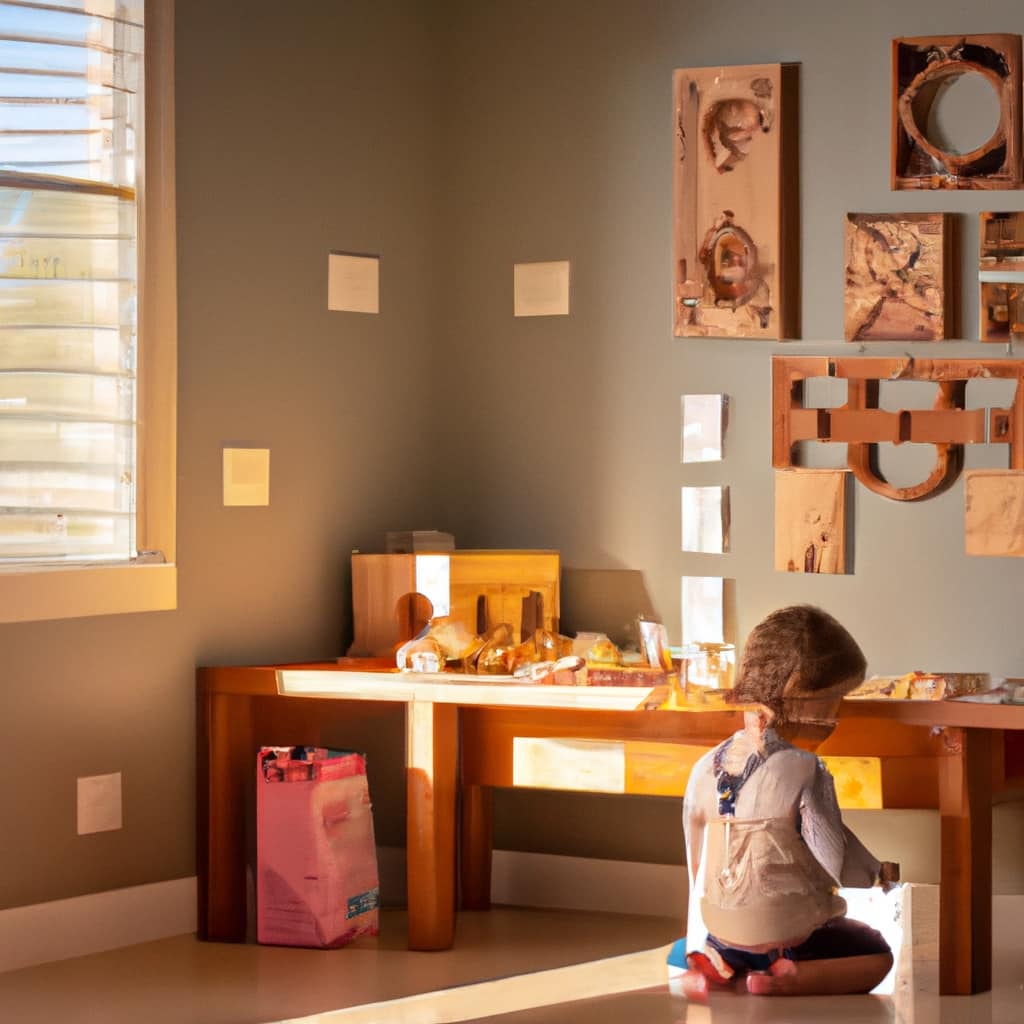
One of the key features of PlanToys is their focus on child development. Their toys are designed to stimulate different aspects of a child’s growth, including cognitive, physical, and social skills. From building blocks to puzzles, PlanToys offers a wide range of options that encourage creativity, problem-solving, and imagination.
With their dedication to sustainability and child development, PlanToys is a brand that not only provides high-quality learning toys, but also contributes to a better future for our planet.
Hape
Continuing our exploration of top quality producers of learning toys, let’s now turn our attention to Hape, a brand that shares a similar commitment to sustainability and child development.
Hape is known for their innovative learning toys that engage children in interactive play while promoting their cognitive, physical, and social development.
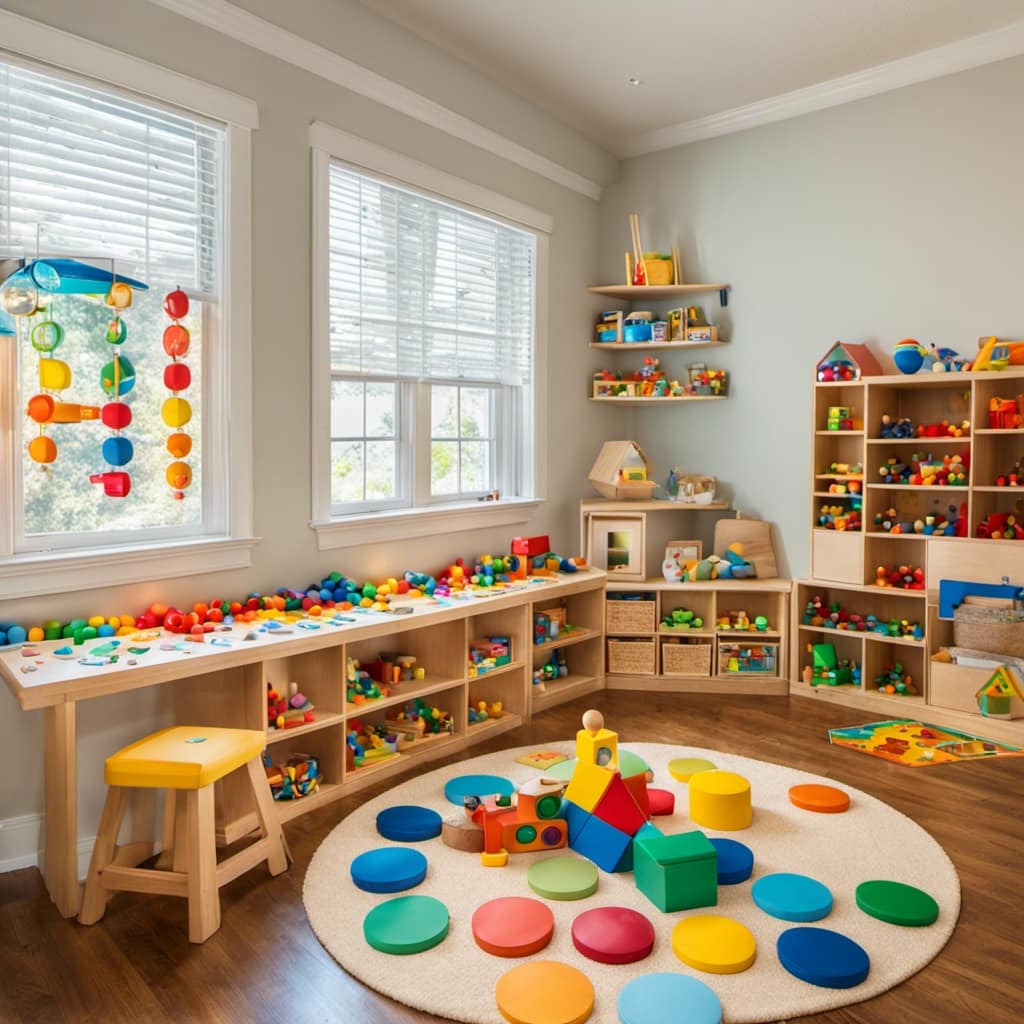
Hape offers a wide range of toys that cater to various age groups and developmental stages. From wooden puzzles and building blocks to musical instruments and pretend play sets, Hape toys provide endless opportunities for children to explore, learn, and grow.
What sets Hape apart is their dedication to using sustainable materials and non-toxic, child-safe finishes. Their toys are designed to withstand years of play, ensuring durability and longevity. Additionally, Hape toys encourage creativity, problem-solving skills, and imaginative play, fostering a well-rounded development in children.
With Hape’s innovative learning toys, children can have fun while acquiring essential skills and knowledge. By investing in Hape toys, parents can provide their children with the tools they need to thrive and succeed.
Grimm’s
Now let’s delve into Grimm’s, another quality producer of learning toys that complements Hape’s commitment to sustainability and child development.
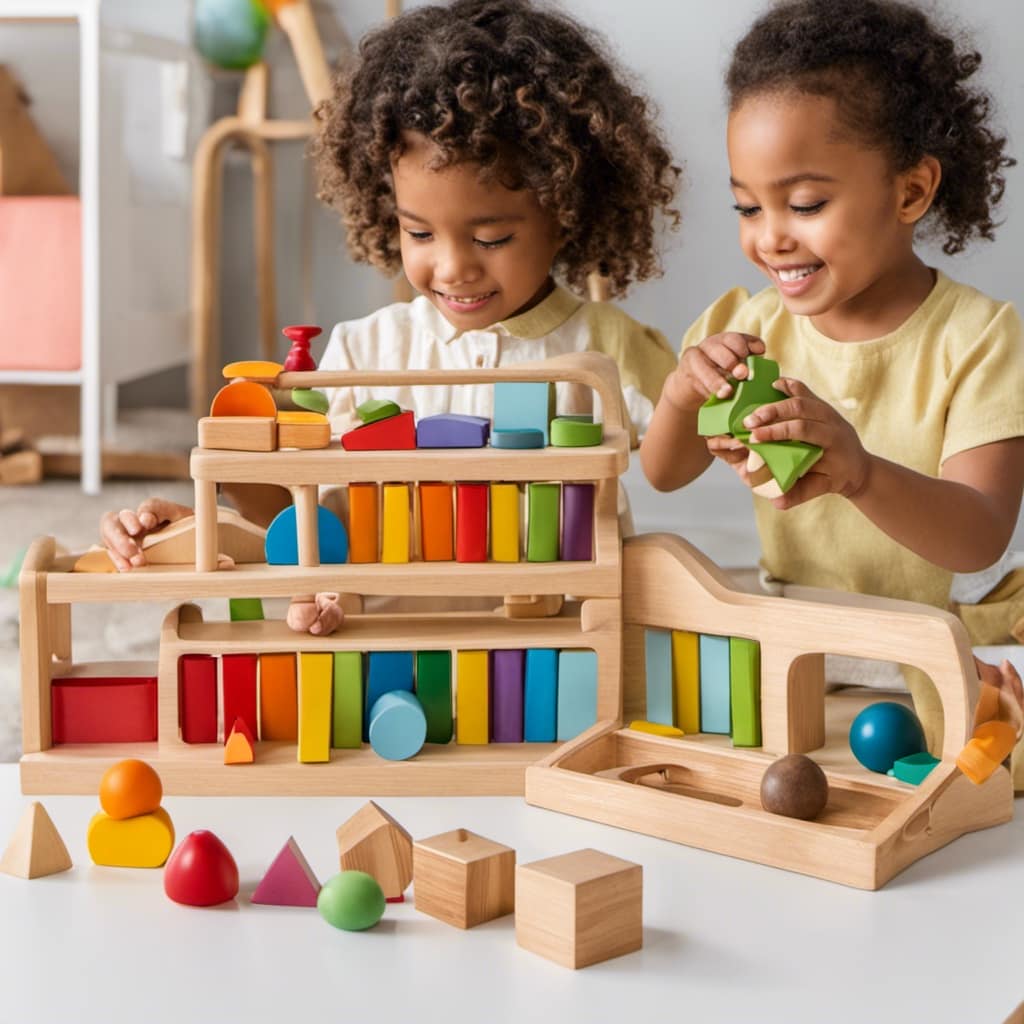
Grimm’s is renowned for their unique wooden toys that promote imaginative play and open-ended learning. Here are some key benefits of Grimm’s toys:
-
Encourages Creativity: Grimm’s toys are designed to inspire children’s creativity and imagination. With their vibrant colors and versatile shapes, children can explore endless possibilities and create their own stories and scenarios.
-
Enhances Problem-Solving Skills: The open-ended nature of Grimm’s toys encourages children to think critically and find solutions to different challenges. Whether it’s building structures or creating intricate patterns, children develop problem-solving skills while having fun.
-
Promotes Fine Motor Skills: Manipulating and arranging the various wooden pieces in Grimm’s toys helps children refine their fine motor skills. From stacking blocks to arranging puzzles, these toys provide hands-on experiences that strengthen hand-eye coordination and dexterity.

-
Sustainable and Eco-Friendly: Grimm’s is committed to sustainability and uses high-quality, natural materials such as wood and non-toxic paints. Their toys are ethically produced, ensuring a safe and eco-friendly playtime experience for children.
Grimm’s toys offer a world of possibilities for children, fostering their development while providing endless hours of engaging play.
Learning Resources
Learning Resources provides a wide range of educational toys and materials designed to enhance children’s learning experiences. Incorporating learning resources in early childhood education offers numerous benefits. These resources help children develop essential skills such as problem-solving, critical thinking, communication, and creativity. They also promote cognitive development, improve fine motor skills, and enhance hand-eye coordination. By engaging with learning toys, children are encouraged to explore, experiment, and discover new concepts independently.
Choosing the right learning toys for your child’s development is crucial. Consider their age, interests, and developmental stage. Look for toys that are age-appropriate and align with their learning goals. Consider toys that encourage imaginative play, promote sensory exploration, and offer hands-on learning experiences. Look for toys that are durable, safe, and made from high-quality materials.
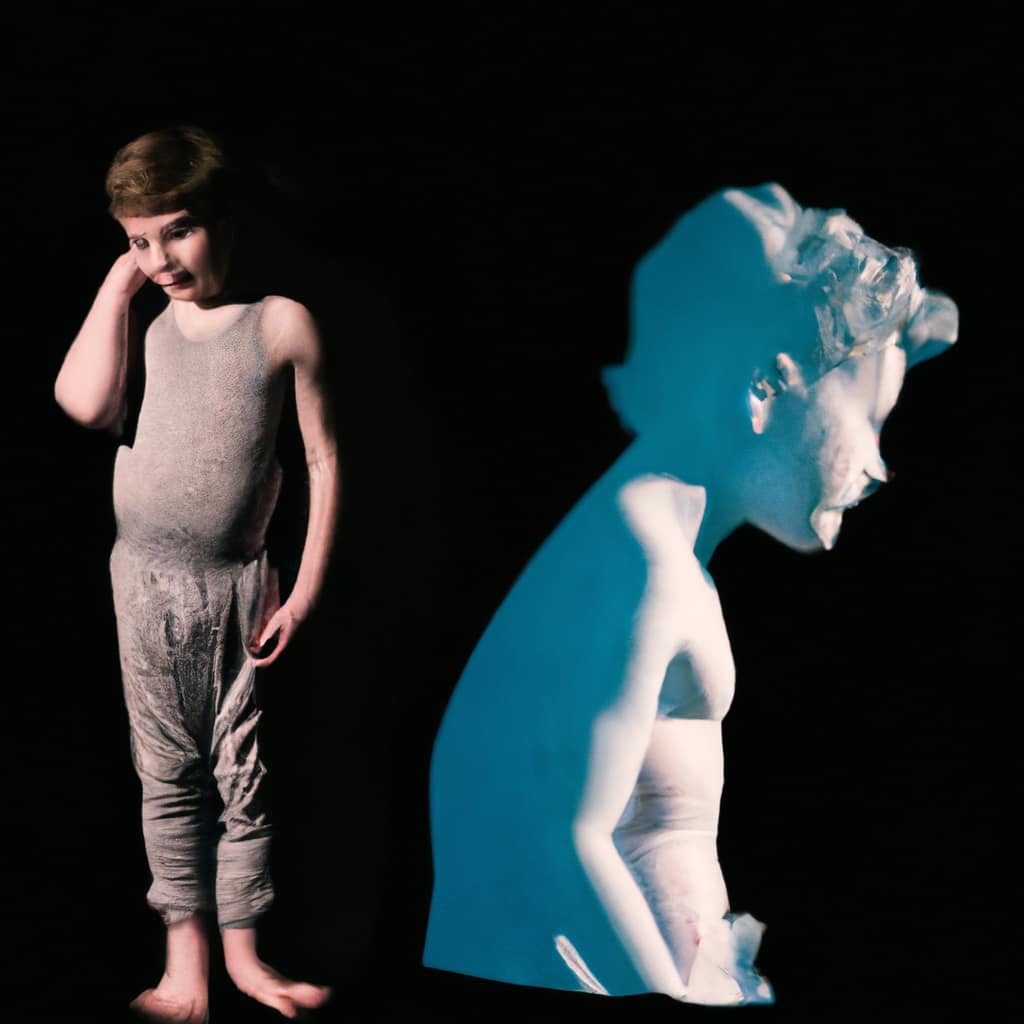
Additionally, involve your child in the decision-making process to foster their independence and encourage their engagement with the learning resources.
Frequently Asked Questions
What Are the Specific Age Ranges That Melissa & Doug’s Learning Toys Cater To?
Melissa & Doug’s learning toys cater to specific age ranges, offering advantages for each group. The toys are designed to promote cognitive development, fine motor skills, and creative thinking in toddlers, preschoolers, and elementary school children.
Are Plantoys’ Learning Toys Made From Sustainable Materials?
Yes, PlanToys’ learning toys are made from sustainable materials. Using eco-friendly materials in children’s toys not only benefits the environment but also teaches kids about sustainability and responsible consumption.
Does Hape Offer Any Educational Resources or Guides to Accompany Their Learning Toys?
Incorporating educational resources with learning toys has several benefits. Parents can utilize educational guides to enhance their child’s learning experience with Hape toys by providing additional information, activities, and guidance for interactive and educational play.
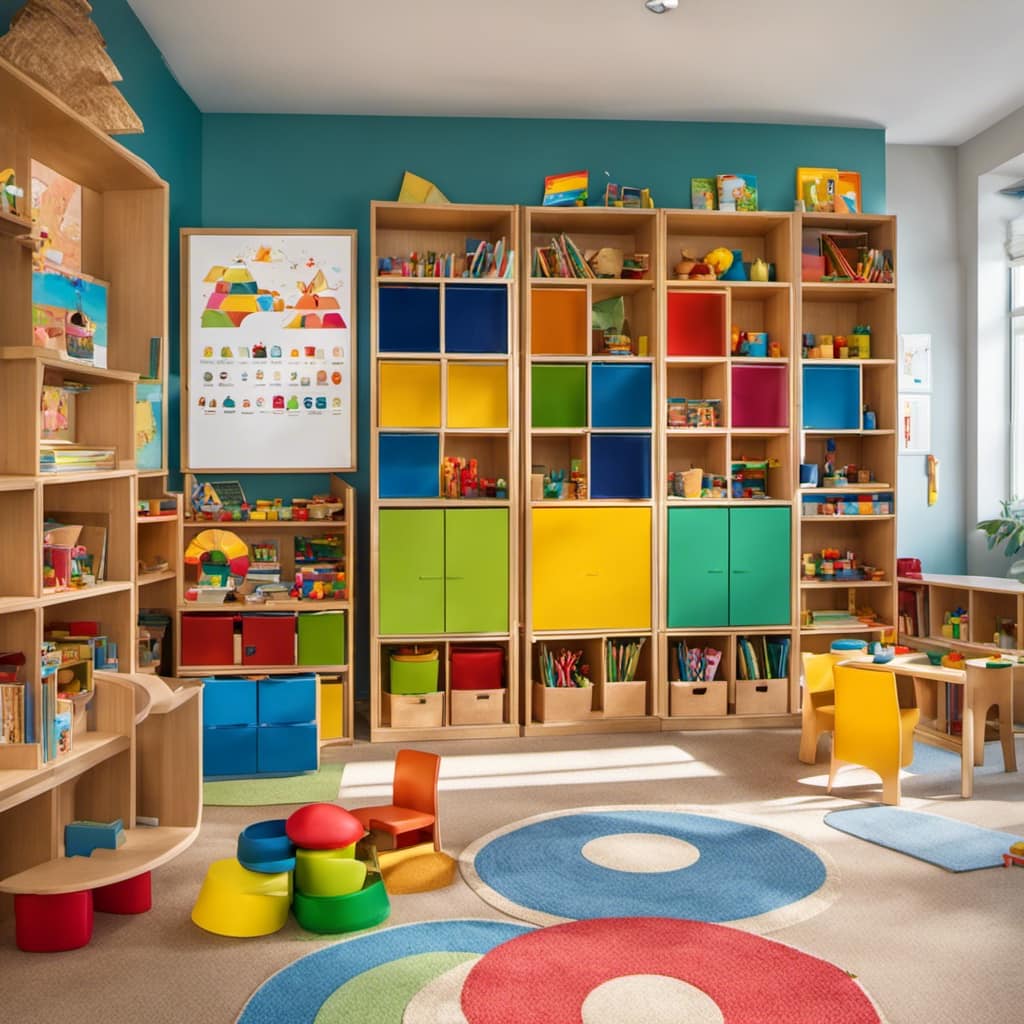
Are Grimm’s Learning Toys Suitable for Children With Special Needs?
Grimm’s learning toys for children with sensory needs can be adapted to suit different abilities. We can explore ways to modify the toys to provide a stimulating and inclusive learning experience for all children.
Can Learning Resources’ Learning Toys Be Used for Homeschooling Purposes?
Using learning toys for homeschooling has both pros and cons. They can enhance educational development by promoting active learning, but may also limit social interaction. Consider the impact on your child’s overall learning experience.
Conclusion
In conclusion, when it comes to quality producers of learning toys, Melissa & Doug, PlanToys, Hape, Grimm’s, and Learning Resources stand out for their commitment to creating educational and engaging products.
These brands offer a wide range of toys that promote cognitive development, creativity, and problem-solving skills in children. With their attention to detail, use of sustainable materials, and innovative designs, these companies have earned their reputation as leaders in the industry.
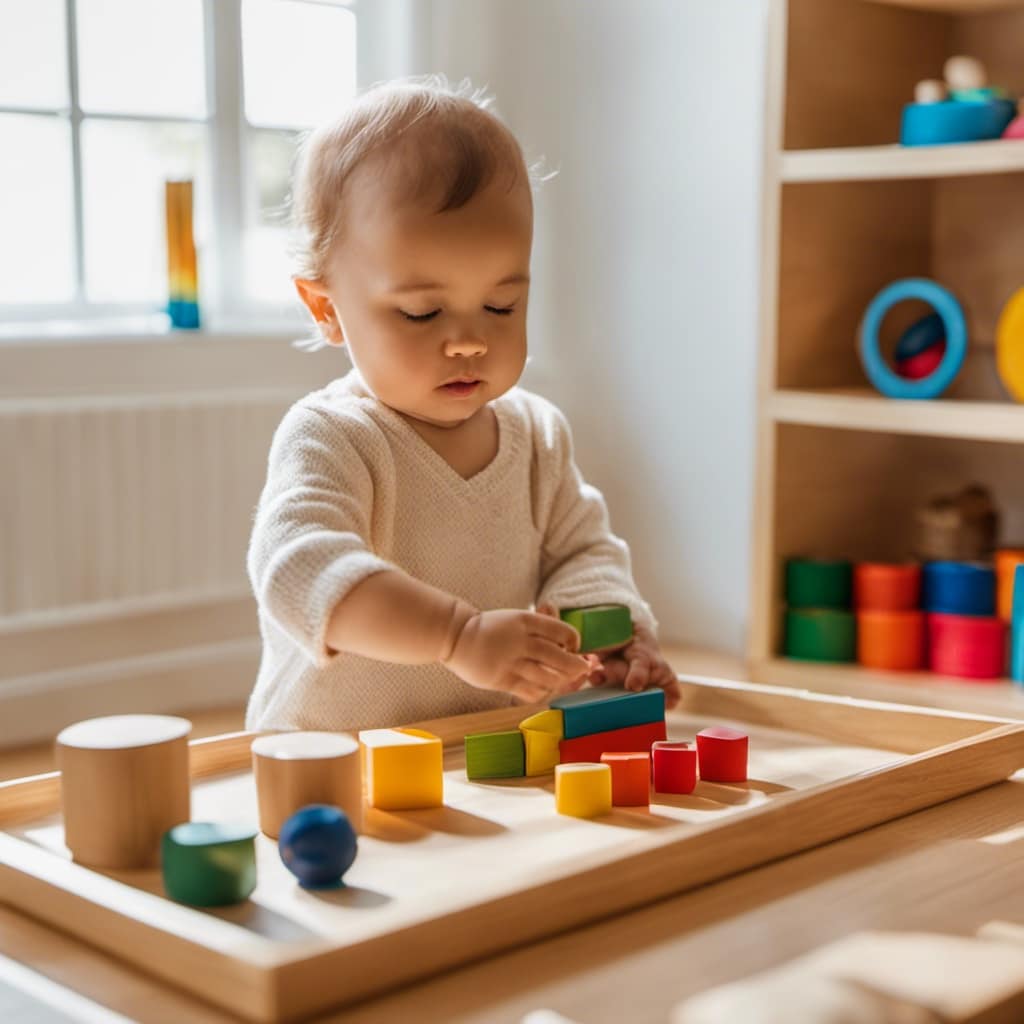
By investing in toys from these producers, parents can ensure that their children receive the best tools for learning and growth.
Mila, a gifted writer with a heart brimming with enthusiasm for child development and playful learning, is the creative force behind the enchanting narratives and insightful articles that grace Toddler Ride On Toys. With a background in early childhood education and a genuine passion for nurturing young minds, Mila weaves words that captivate, educate, and inspire parents, caregivers, and educators.
Montessori Toys
5 Best Economical Options for Kids’ Montessori Toys
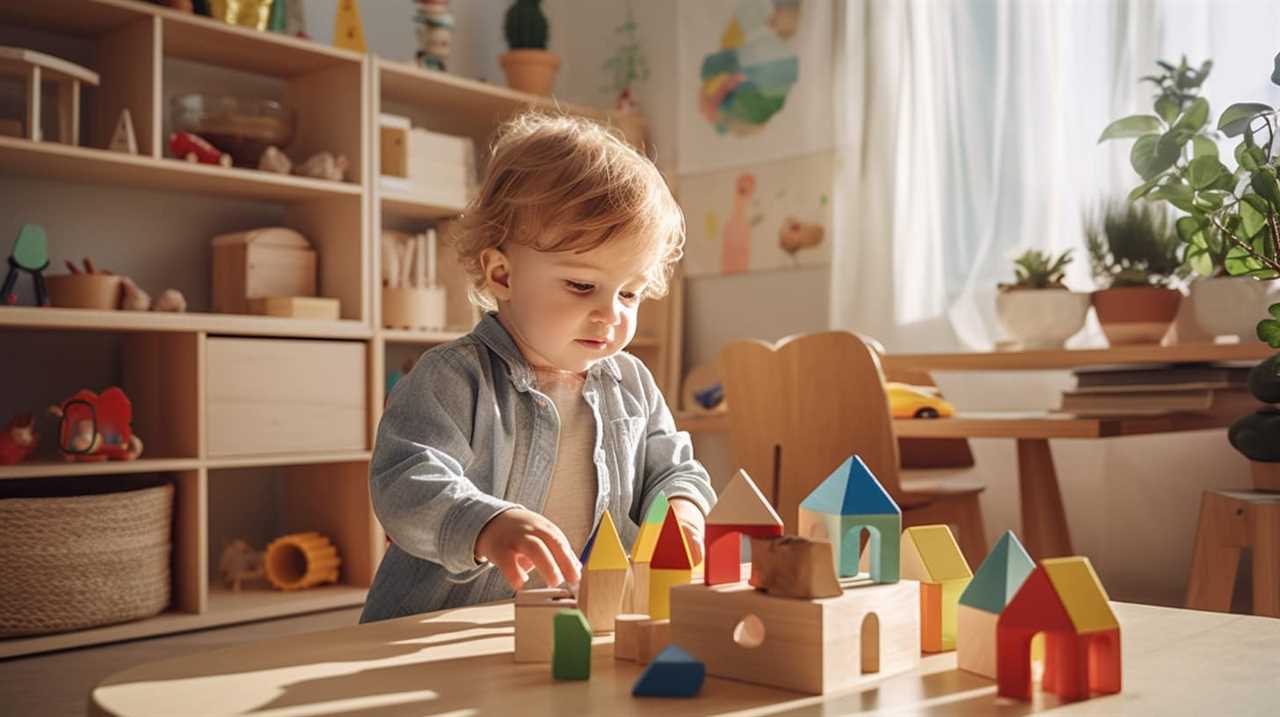
Finding affordable Montessori toys for kids can be a challenge. But fret not! We have put together a list of the top budget-friendly options just for you.
With our expert knowledge and research, we’ve found the top brands that won’t break the bank. Get ready to provide quality educational toys for your little ones without draining your wallet.
Let’s dive in and explore the five best economical options for kids’ Montessori toys.
Key Takeaways
- Materials used in construction, complexity of design, brand reputation, and quality and durability of materials are factors that affect Montessori toy costs.
- Lovevery, Hape, Melissa & Doug, and PlanToys are top affordable Montessori toy brands known for their quality and child-friendly designs.
- To find budget-friendly Montessori toys, consider open-ended toys, DIY options, budget-friendly subscription services, sales and discounts, and second-hand options from online marketplaces and thrift stores.
- Cost-effective DIY Montessori toy ideas include repurposing household items, finding items at thrift stores, DIY projects, and using nature-inspired toys and everyday household objects.
Factors Affecting Montessori Toy Costs
Factors that impact Montessori toy costs include materials, complexity, and brand reputation.
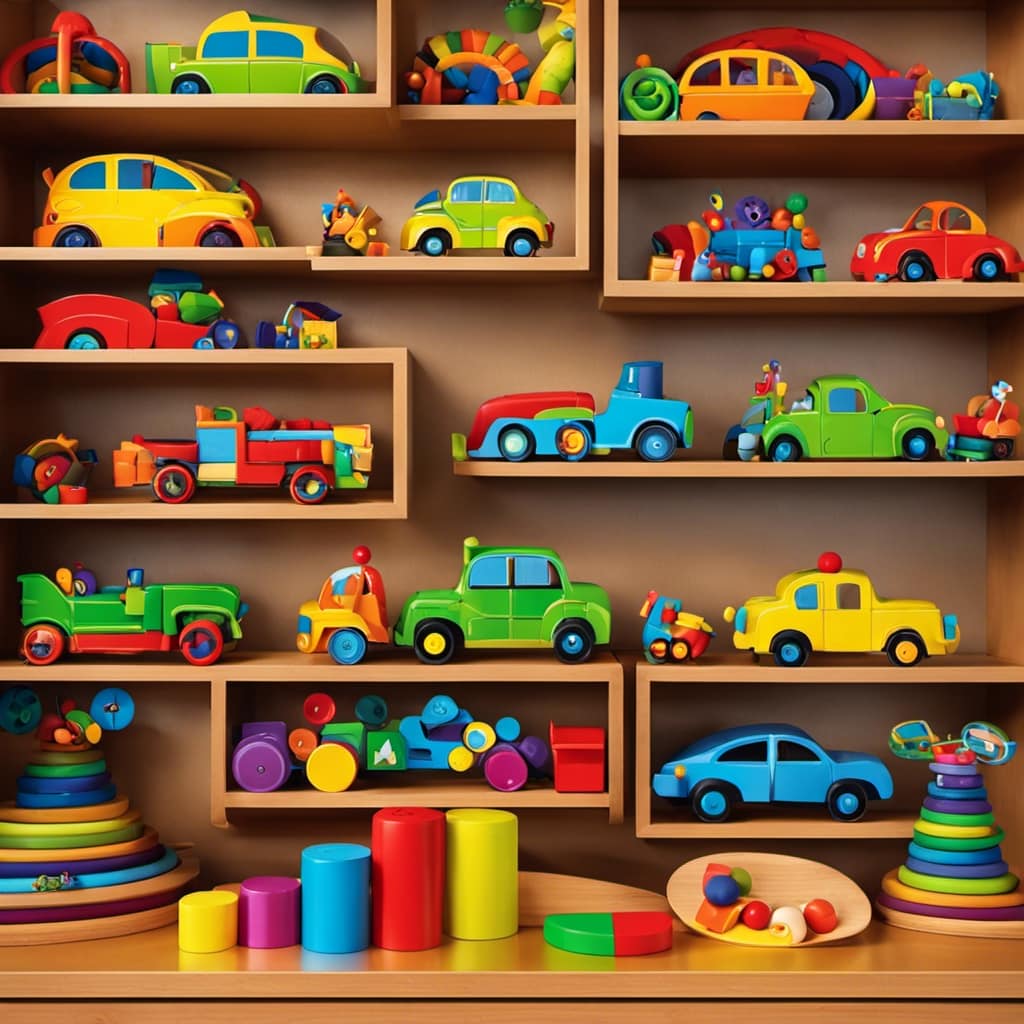
The quality of materials used in the construction of Montessori toys plays a significant role in determining their cost. High-quality materials, such as sustainably sourced wood or natural fabrics, tend to be more expensive, but they also ensure durability and safety for your child. On the other hand, cheaper materials may compromise the toy’s quality and longevity.
Brand reputation also influences Montessori toy prices. Well-established brands with a proven track record of producing high-quality educational toys are likely to charge more for their products. This is because they’ve invested in research and development, ensuring that their toys meet the educational standards of the Montessori method. However, there are also smaller, independent brands that offer affordable options without compromising on quality.
Understanding the impact of material quality and brand reputation on Montessori toy costs can help you make informed decisions when selecting toys for your child. By considering these factors, you can strike a balance between affordability and quality, ensuring that your child receives the best educational experience without breaking the bank.
Top Affordable Montessori Toy Brands
One of our favorite affordable Montessori toy brands is Lovevery. Lovevery offers Montessori inspired toy subscription services that deliver age-appropriate toys right to your doorstep. Their toys are designed to stimulate learning and promote development in children from birth to age four. Lovevery toys are crafted with high-quality materials and are designed to be durable, ensuring they can withstand the active play of young children.
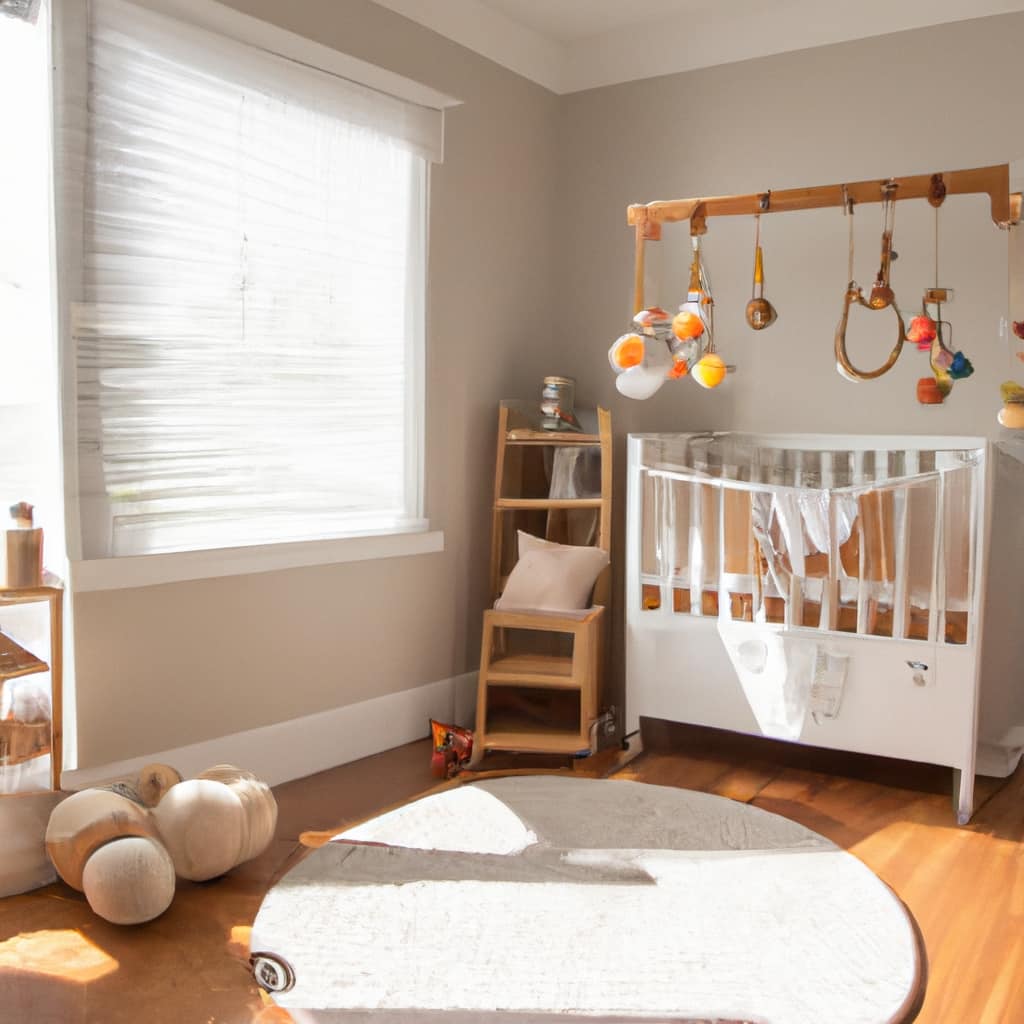
Another great option for affordable Montessori toys is to explore second-hand options. Websites such as eBay, Craigslist, and local buy/sell groups often have listings for gently used Montessori toys at a fraction of the original price. By opting for second-hand Montessori toys, you not only save money but also contribute to a sustainable and eco-friendly approach to toy shopping.
Budget-Friendly Montessori Toy Recommendations
After exploring affordable Montessori toy brands such as Lovevery and considering second-hand options, we can now discuss some budget-friendly recommendations for Montessori toys.
When it comes to affordable Montessori toy alternatives, there are a few options to consider. Firstly, you can opt for open-ended toys that can be used in multiple ways, such as wooden blocks or stacking rings. These toys promote creativity and problem-solving skills while being cost-effective.
Another budget-friendly option is to DIY Montessori-inspired toys using materials you already have at home. Repurposing everyday objects like empty containers or fabric scraps can make for engaging and educational toys.
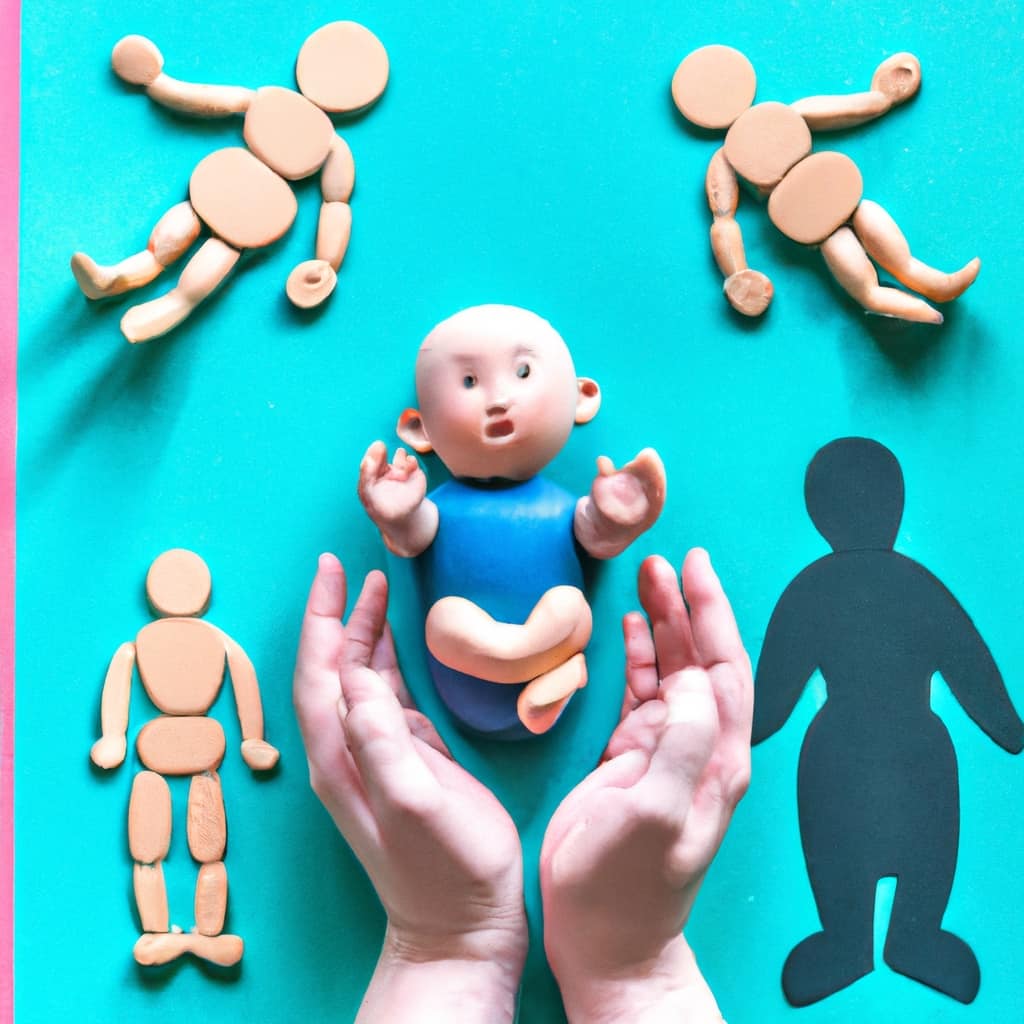
Additionally, some companies offer budget-friendly Montessori toy subscription services, which provide a variety of age-appropriate toys each month at a lower cost than purchasing individual toys. These subscription services allow your child to experience a range of Montessori-inspired activities without breaking the bank.
Tips for Finding Affordable Montessori Toys
To maximize our budget and find affordable Montessori toys, we can utilize effective strategies for sourcing cost-effective options. Here are three tips for finding affordable Montessori toys:
-
Secondhand Montessori toys: Consider purchasing gently used Montessori toys from online marketplaces, local thrift stores, or through local parent groups. Many families sell or donate their gently used toys, allowing you to save money while still providing your child with quality Montessori materials.
-
Sales and discounts on Montessori toys: Keep an eye out for sales and discounts on Montessori toys from various retailers. Sign up for newsletters or follow social media accounts of Montessori toy brands to stay updated on any promotions or special offers. This way, you can snag some great deals and save money on your purchases.
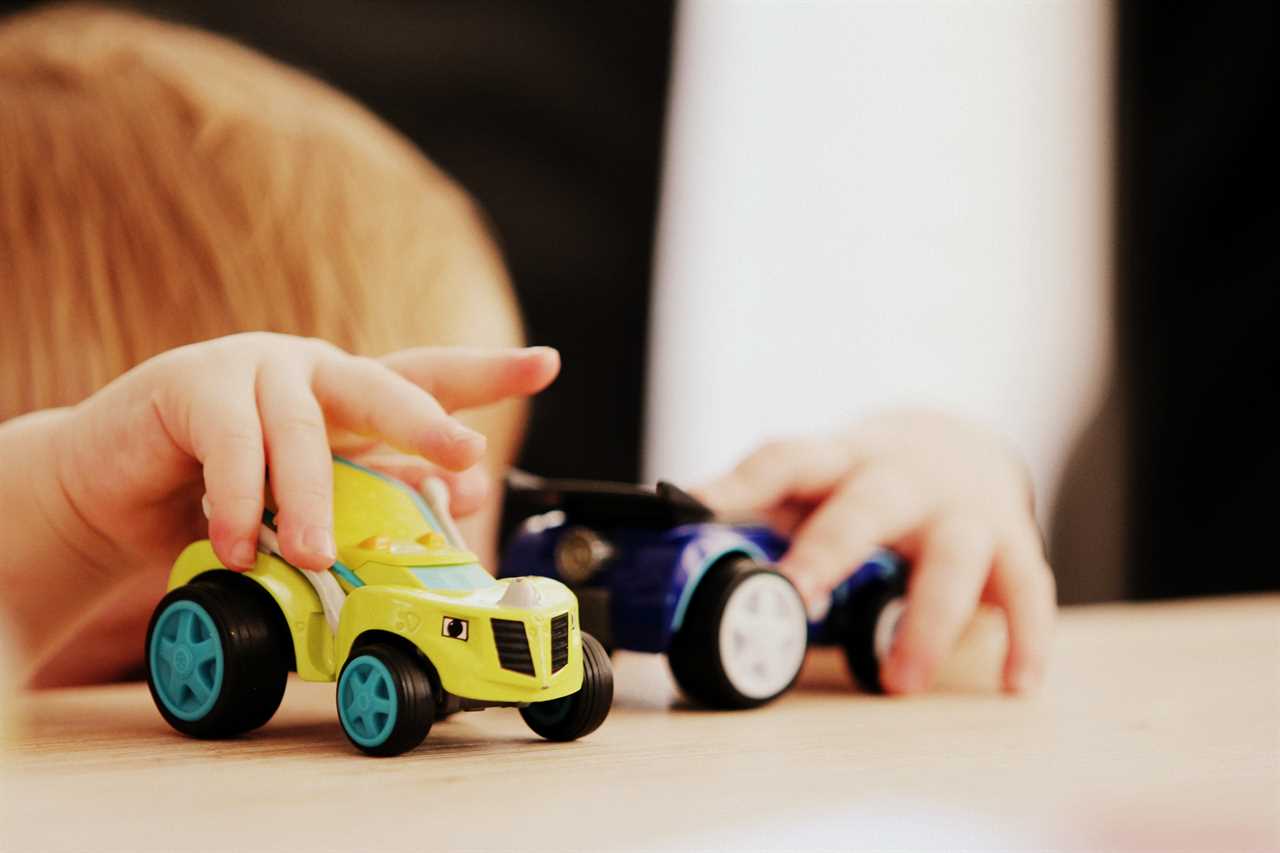
-
DIY Montessori toys: Get creative and make your own Montessori toys using materials you already have at home. There are plenty of DIY Montessori toy ideas available online that are budget-friendly and can be customized to suit your child’s interests and developmental needs.
Cost-Effective DIY Montessori Toy Ideas
Let’s explore some cost-effective DIY Montessori toy ideas that you can easily create at home.
One great option is to upcycle everyday items into Montessori toys. For example, you can turn old cardboard boxes into shape sorters or sensory bins by cutting out different holes and adding various textures.
Another idea is to repurpose empty containers and fill them with different objects, such as dried beans or buttons, for a DIY sound matching game.
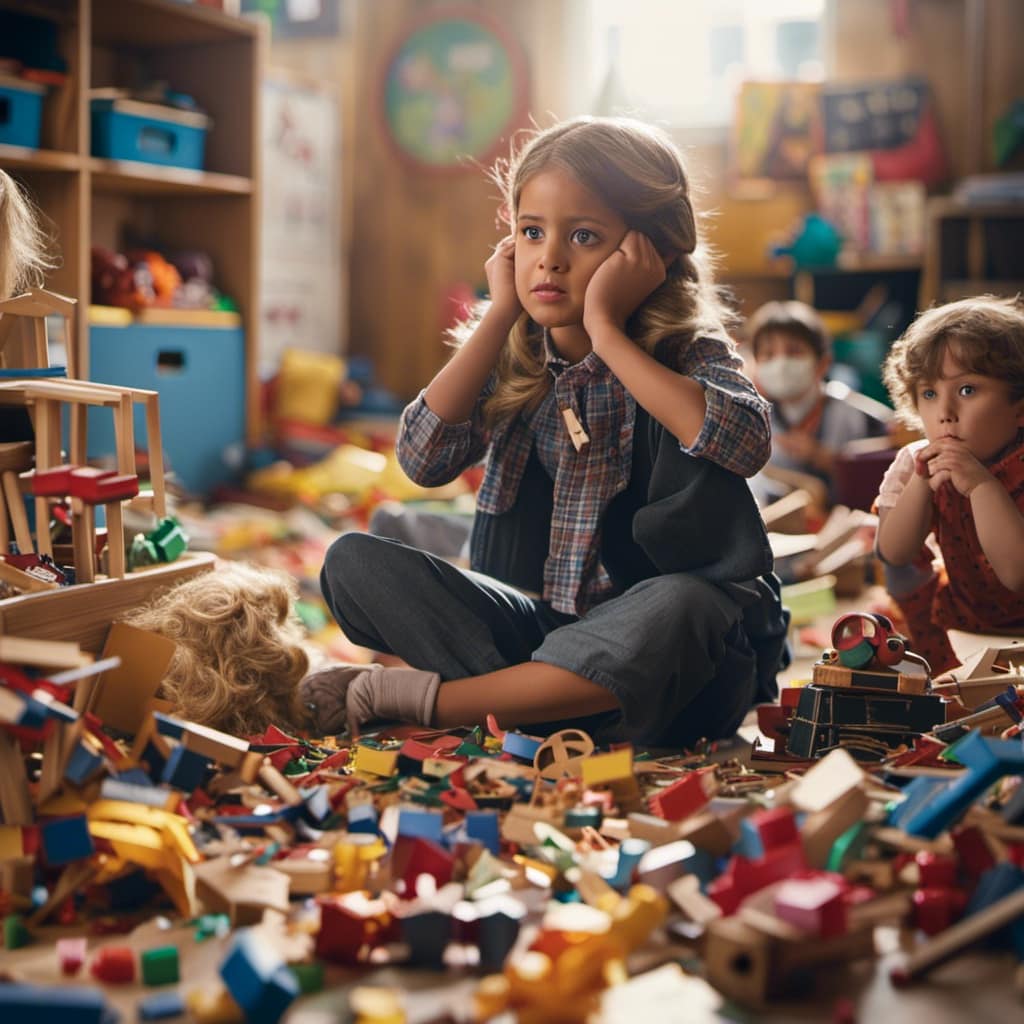
Thrift stores are also a great resource for finding affordable Montessori toys. Look for items like wooden puzzles, stacking toys, or small containers that can be used for sorting activities. With a little creativity and some paint, you can easily transform these thrift store finds into Montessori-inspired toys.
By using upcycled materials and shopping at thrift stores, you can create a variety of Montessori toys without breaking the bank. These DIY projects not only save you money but also promote sustainability and encourage resourcefulness.
Frequently Asked Questions
Are Montessori Toys Only Suitable for Young Children or Can Older Kids Benefit From Them as Well?
Montessori toys are not limited to young children; older kids can also benefit from them. Montessori toys offer unique benefits such as promoting independence and critical thinking, which traditional toys may not provide.
How Long Do Montessori Toys Typically Last Before Needing to Be Replaced?
Montessori toys can last a long time, but their lifespan depends on various factors like quality, materials, and how they are used. It’s important to choose durable toys that can withstand repeated play.
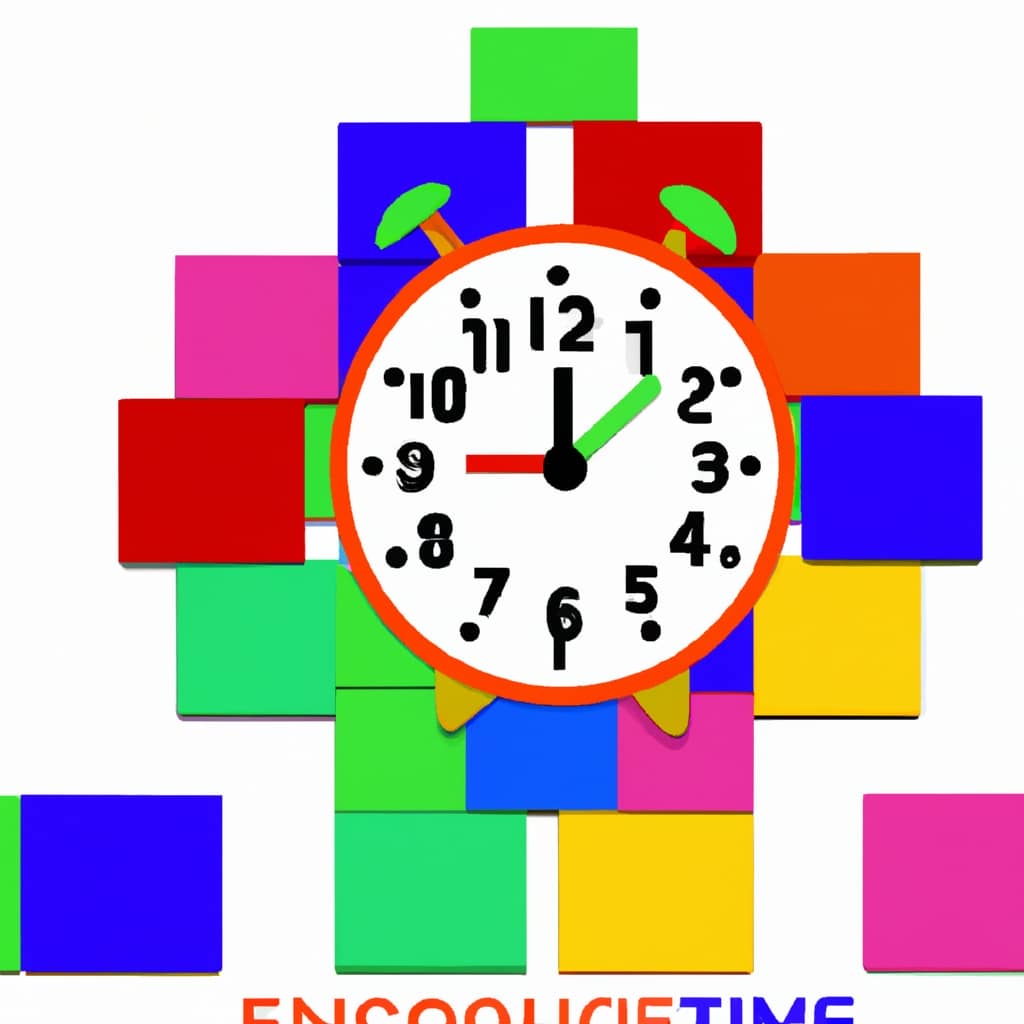
Can Montessori Toys Be Used in a Traditional Classroom Setting or Are They Only for Home Use?
Montessori toys can be used in a traditional classroom setting, not just at home. They offer numerous benefits for older kids, such as fostering independence, promoting problem-solving skills, and encouraging hands-on learning.
Are There Any Safety Concerns to Consider When Using Montessori Toys?
When it comes to Montessori toys, safety concerns are important to consider. However, the benefits for older kids are worth it. Let’s explore how to ensure a safe and enriching play environment.
What Are Some Alternatives to Montessori Toys That Offer Similar Educational Benefits at a Lower Cost?
Looking for budget-friendly alternatives for Montessori toys? Consider DIY Montessori-inspired toys. They offer similar educational benefits at a lower cost. Get creative and engage your little ones in cost-conscious educational play!
Conclusion
In conclusion, finding affordable Montessori toys doesn’t have to be a daunting task. By considering factors that affect costs, exploring budget-friendly brands, and utilizing cost-effective DIY ideas, parents can provide their children with enriching educational toys without breaking the bank.
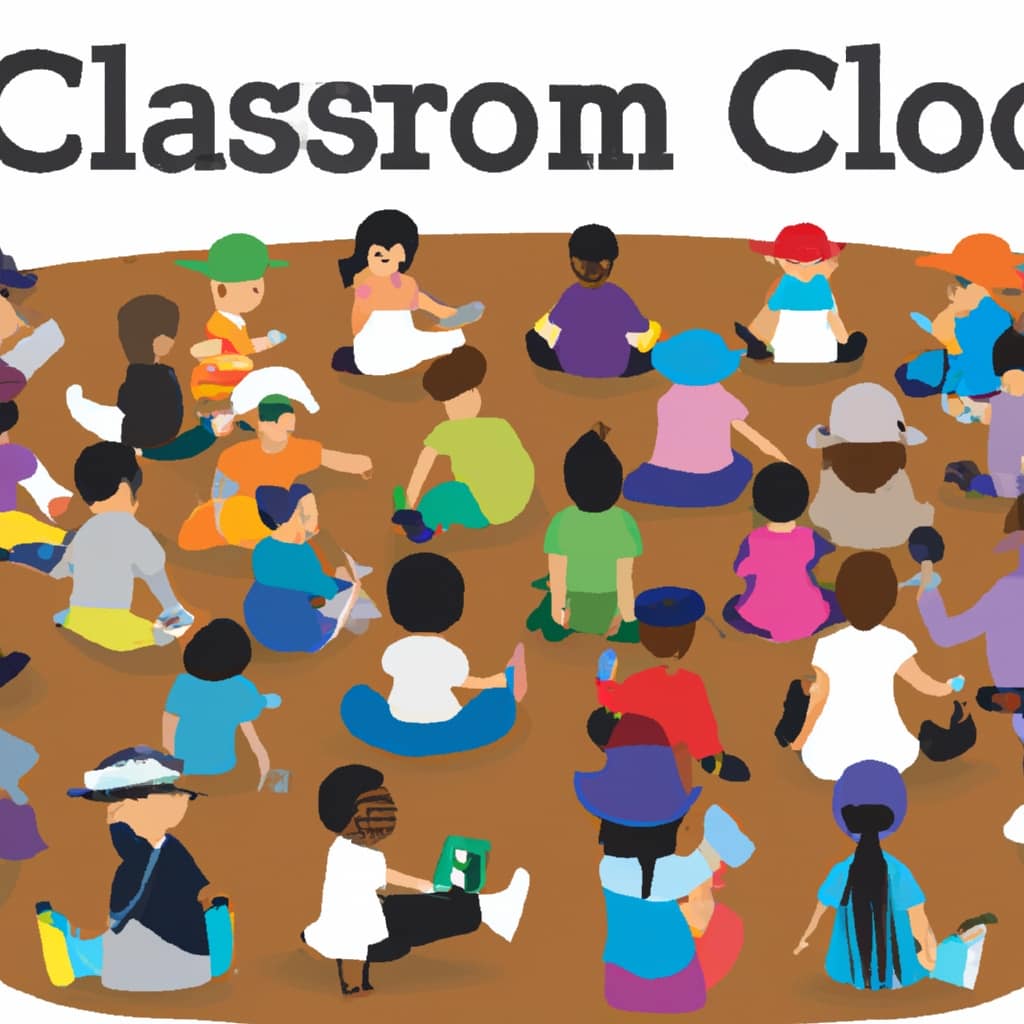
Remember, with a little creativity and resourcefulness, it’s possible to find the perfect Montessori toys that are both economical and engaging. So start your search today and watch your child’s learning journey flourish!
Mila, a gifted writer with a heart brimming with enthusiasm for child development and playful learning, is the creative force behind the enchanting narratives and insightful articles that grace Toddler Ride On Toys. With a background in early childhood education and a genuine passion for nurturing young minds, Mila weaves words that captivate, educate, and inspire parents, caregivers, and educators.
-

 Child Development3 months ago
Child Development3 months agoWhat Is a Theory in Child Development
-

 Child Development3 months ago
Child Development3 months agoThe Science Behind How Parents Affect Child Development
-

 Child Development3 months ago
Child Development3 months agoWhat Do You Do in Child Development Class in High School
-

 Child Development3 months ago
Child Development3 months agoHow Parenting Styles Affect Child Development
-

 Child Development3 months ago
Child Development3 months agoWhat Is Child Development?
-

 Child Development3 months ago
Child Development3 months agoHow Does Piaget’s Theory Impact Child Development
-

 Preschool Toys6 months ago
Preschool Toys6 months agoTop 8 Interactive Role-Play Toys for Preschoolers Reviewed
-

 Child Development3 months ago
Child Development3 months agoHow Does Food Insecurity Affect Child Development











